Health: The Ultimate Treasure Chapter Notes | Chapter Notes For Class 8 PDF Download
Have you ever wondered what it really means to be healthy—is it just not being sick, or is there more to it? This chapter will help you discover how good health includes not only your body, but also your mind, your habits, and your relationships with others. Let’s explore how to stay healthy and keep diseases away in simple, practical ways!
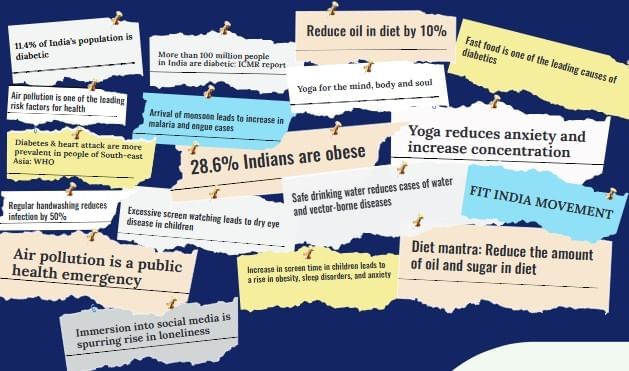
Health: Is It More Than Not Falling Sick?
Health is not just about not being sick. It means feeling good in your body, mind, and social life. According to the World Health Organization (WHO), health is a state of complete physical, mental, and social well-being, not just the absence of disease.
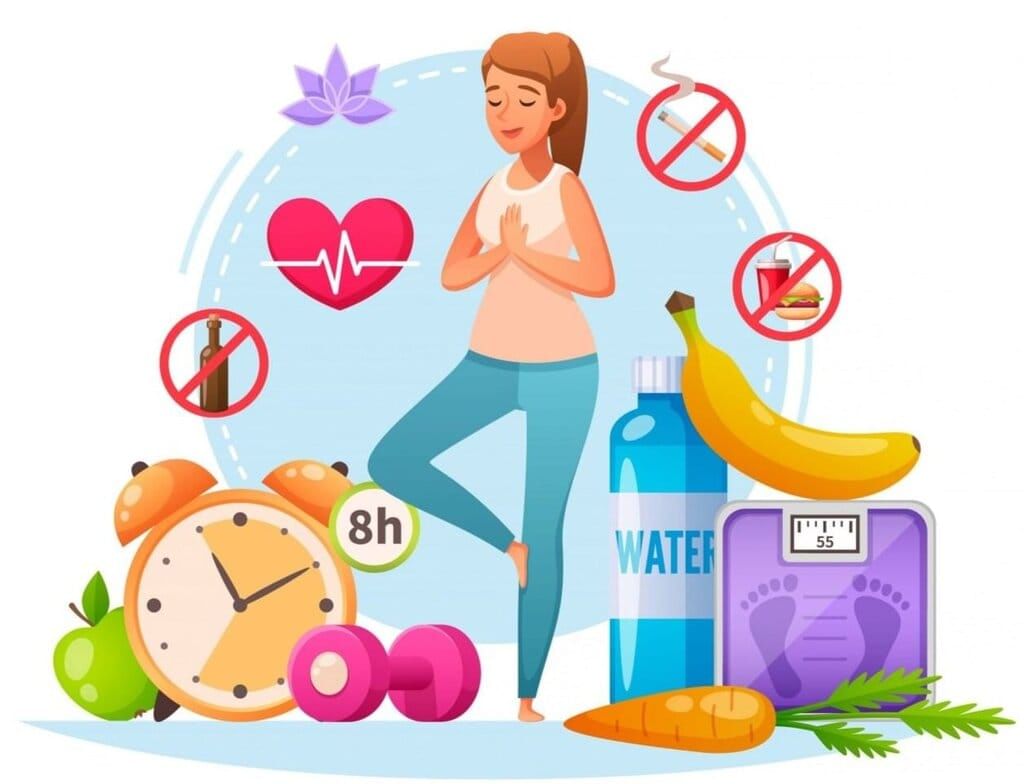
A healthy person can:
- Do tasks efficiently.
- Handle tough situations well.
- Get along with friends and others in society.
Key Aspects of Health
- Physical Health: Taking care of your body through proper food, exercise, and sleep.
- Mental Health: Staying positive and managing stress.
- Social Health: Having good relationships with friends and others.
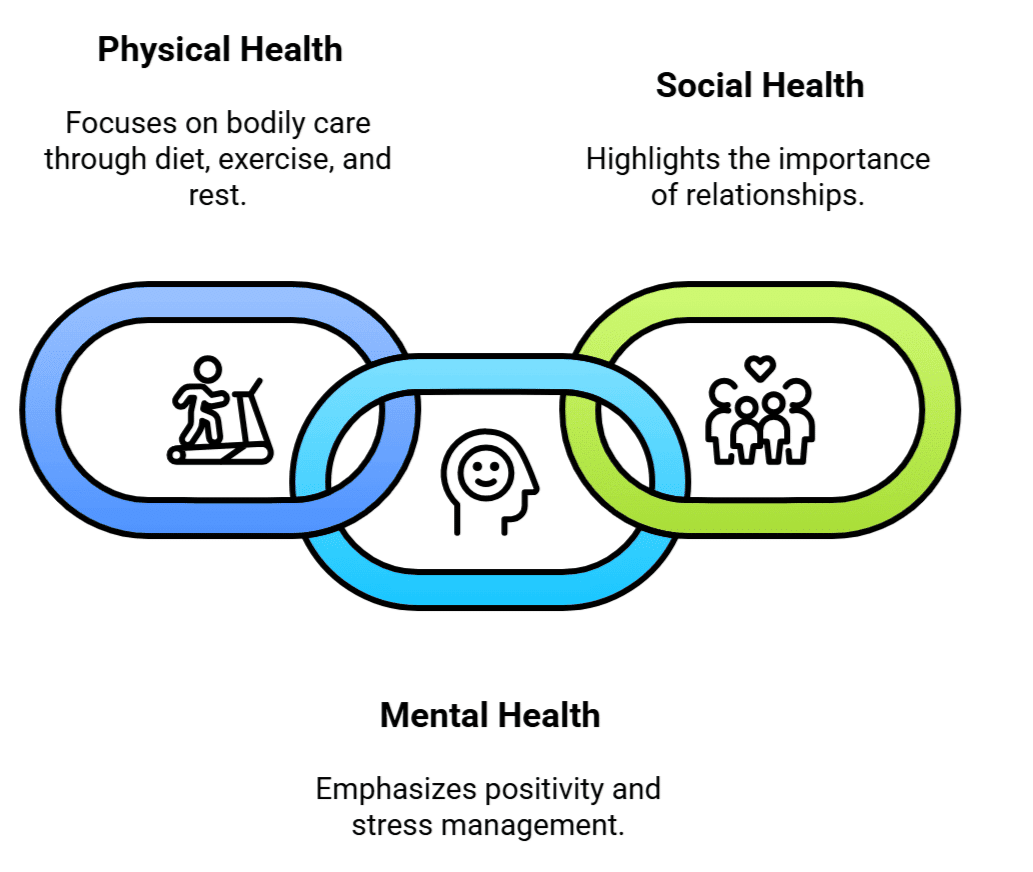
A Student’s Story
A Class 8 boy moved to a new city and school. He felt lonely with no friends and busy parents. He spent more time on his phone and social media, which made him feel worse and caused:
- Headaches.
- Weight loss.
- Trouble sleeping.
Cause and Solution
A doctor suggested less screen time and seeing a counsellor. The counsellor helped him make friends, and his health improved.
- Loneliness and too much screen time caused both physical and mental health problems.
- Making new friends and support from adults helped him feel better.
Ayurveda and Health

- Ayurveda teaches that health is a balance of body, mind, and surroundings.
- Follow a daily routine (dinacharya) and seasonal routine (ritucharya).
- Eat fresh, wholesome food suited to your prakriti (body type).
- Practice regular exercise, cleanliness, restful sleep, and a calm mind through yoga, meditation, and mindfulness.
How Can We Stay Healthy?
Staying healthy involves:
- Eating nutritious food.
- Keeping clean (personal hygiene and surroundings).
- Exercising regularly.
- Getting enough sleep.
- Spending time with family and friends.
- Having a positive attitude.
Good and Bad Habits
Good Habits:
- Keep yourself clean and maintain personal hygiene.
- Eat a healthy and balanced diet.

- Exercise regularly.
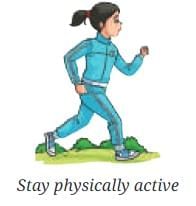
- Make time to relax or meditate every day.

Bad Habits (harmful to health):
- Spending too much time on mobile phones or screens.
- Eating fast food or junk food every day.
- Sleeping very late or not getting enough sleep.
- Skipping meals, especially breakfast.
Maintain a Healthy Lifestyle
Our health depends on many factors. These factors include our lifestyle (how we live) and our environment (our surroundings).
- We should Eat a balanced diet with: Plenty of fruits, vegetables, and whole grains.
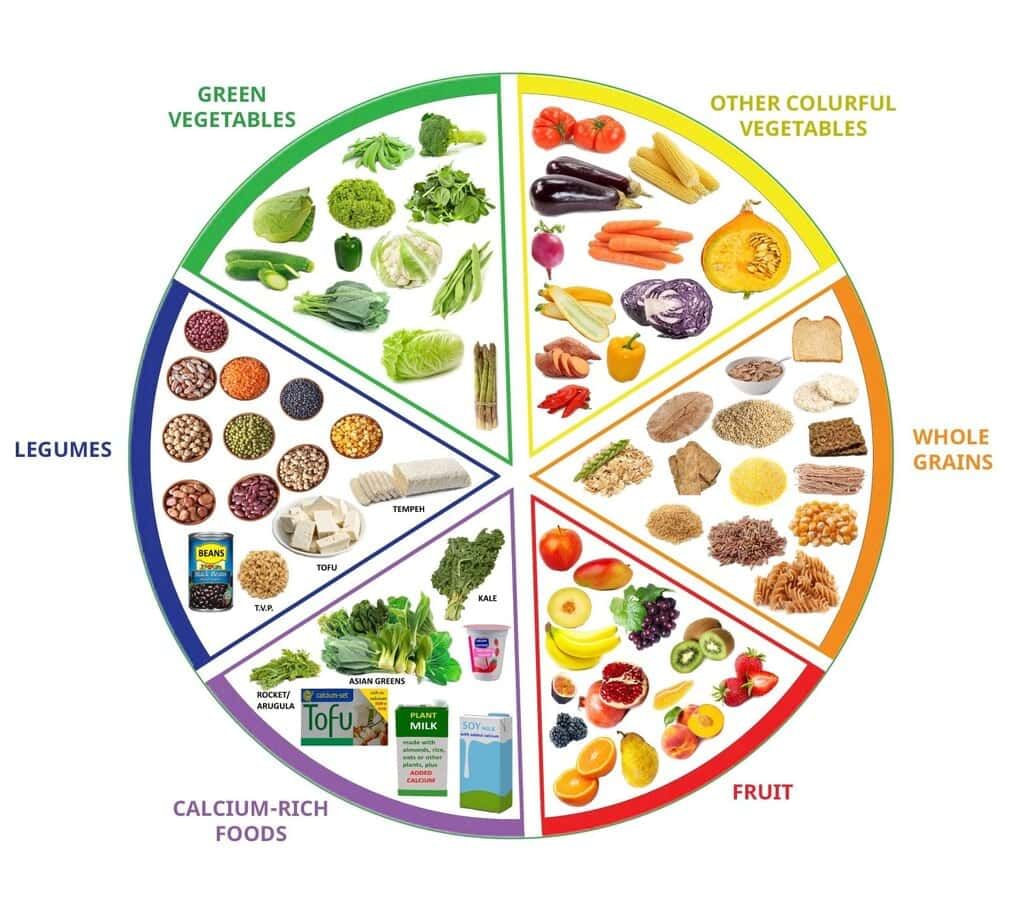 Balanced Diet
Balanced Diet - Avoid processed, fatty, or sugary foods and drinks.
- Stay physically active and Play outdoors, walk, run, cycle, or exercise.
- Limit screen time and spend more time in nature.
- Get enough sleep to help our body and mind rest.
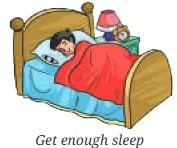
- Practice yoga or pranayama (simple breathing exercises) regularly.
- Say ‘NO’ to harmful substances like tobacco, alcohol, and addictive drugs.
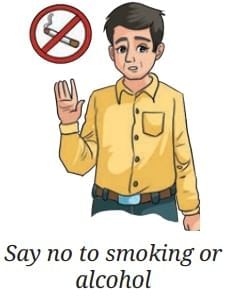
Keep the Environment Clean
- A clean, well-maintained playground is better for playing because it’s safe and healthy.
- A dirty, polluted playground has flies, mosquitoes, and can make you sick.
Why Clean Surroundings Matter:
- Clean air and water are important for health.
- Pollution from vehicles or factories can cause coughing or asthma.
- The Air Quality Index (AQI) shows how clean or polluted the air is.
- A clean environment helps you stay healthy and feel good.
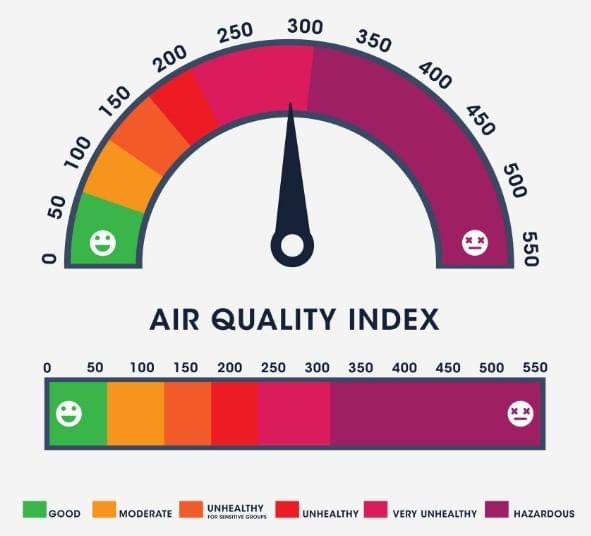
Keeping Surroundings Clean:
- Avoid littering and keep your area tidy.
- A clean environment reduces the risk of diseases.
Importance of Feelings and Relationships
- Health is not just about the body; feelings and relationships matter too.
- Even with good food and a clean place, you may feel bad if you’re lonely or upset.
- Spend time with friends and family, talk, laugh, and have fun to keep your mind healthy.
How Do We Know That We Are Unwell?
Our body usually works in a specific way to keep us healthy.
- When we feel unwell, something inside our body may not be working properly.
- We experience symptoms and signs that show we are not healthy.
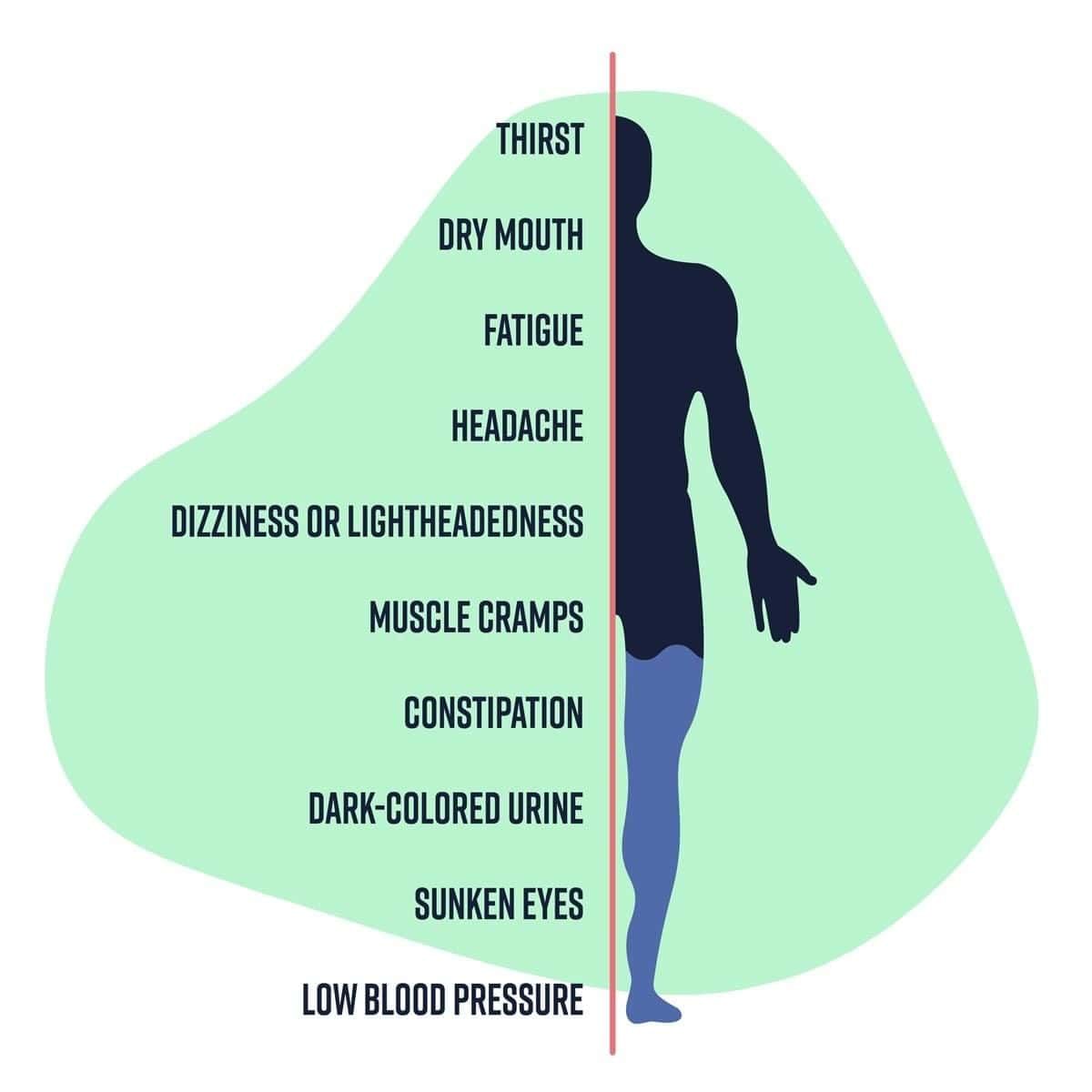 Symptoms of Dehydration
Symptoms of Dehydration
Symptoms and Signs
- They act as clues to show that our body is not working as it should.
- Doctors use these clues to understand the cause of our illness and suggest treatment.
Symptoms:
- What we feel when we are unwell.
- Examples: Pain, tiredness, dizziness.
Signs:
- Things that can be seen or measured by others, like a doctor.
- Examples: Fever (high body temperature), rash, high blood pressure, swelling.
Diseases - What Are the Causes and Types?
- A disease is a condition that stops the body or mind from working normally.
- It happens when one or more organs or organ systems do not function properly.
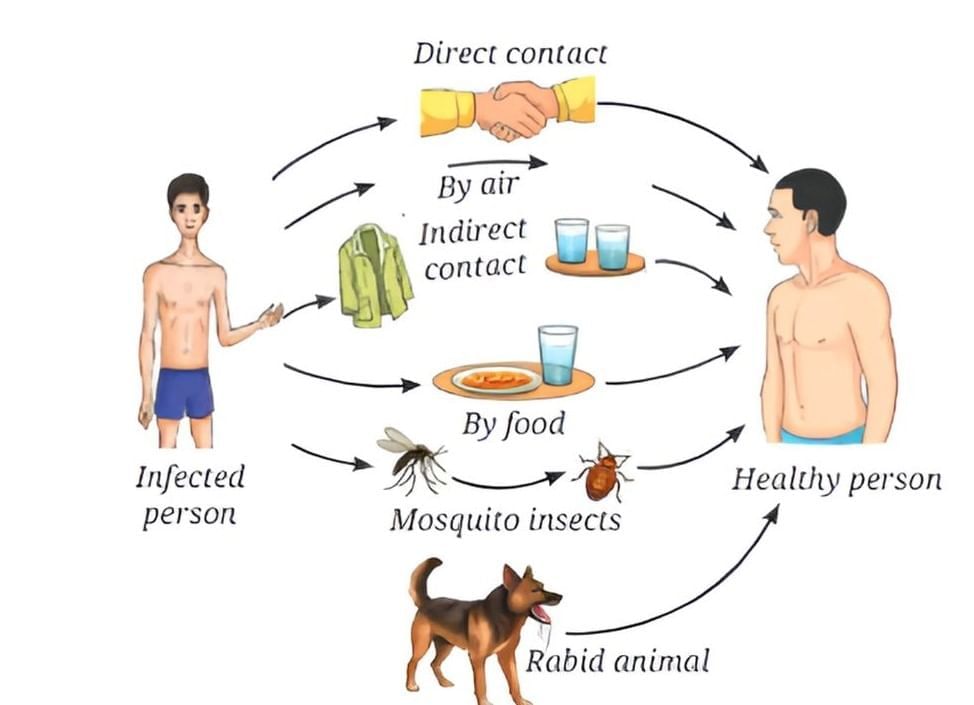 Common Methods of Transmission of Diseases
Common Methods of Transmission of Diseases
Causes of Diseases
- Pathogens: Germs like bacteria, viruses, fungi, worms, or protozoa (single-celled organisms) that cause diseases.
- Poor Nutrition: Not eating enough healthy food can lead to diseases.
- Unhealthy Lifestyle: Bad habits like lack of exercise or poor diet can cause diseases.
Types of Diseases
Diseases can be grouped into two major types based on their causes and how they spread:
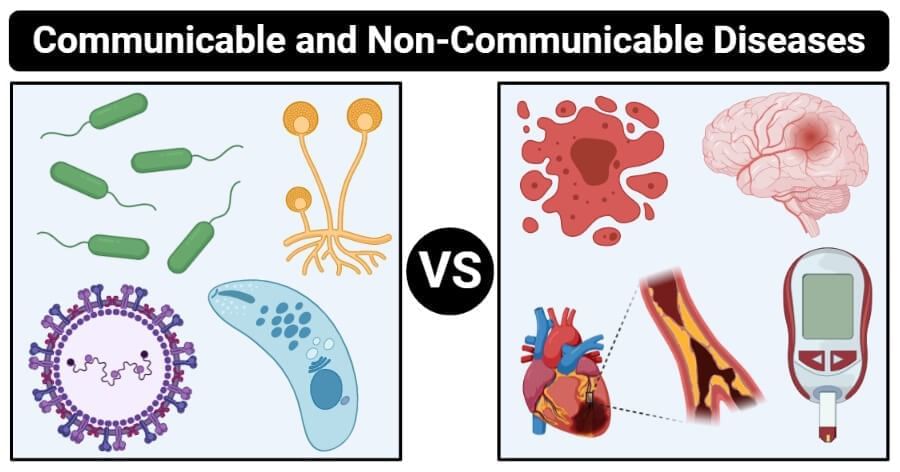 1. Communicable Diseases: Can spread from one person to another. Caused by pathogens. Examples: Typhoid, dengue, flu, chickenpox, COVID-19.
1. Communicable Diseases: Can spread from one person to another. Caused by pathogens. Examples: Typhoid, dengue, flu, chickenpox, COVID-19.
Spread through: Communicable Diseases
Communicable Diseases
- Air: Coughing or sneezing (e.g., flu, tuberculosis).
- Direct contact: Touching an infected person (e.g., shaking hands).
- Indirect contact: Sharing items like towels or handkerchiefs.
- Contaminated food or water: Eating or drinking unsafe food/water (e.g., cholera, typhoid).
- Vectors: Insects like mosquitoes or houseflies (e.g., malaria, dengue).
2. Non-Communicable Diseases (NCDs): Not caused by pathogens and do not spread from person to person.Linked to lifestyle, diet, or environment.Examples: Cancer, diabetes, asthma, heart disease. Non- Communicable Diseases
Non- Communicable Diseases
- Deficiency diseases: Caused by lack of nutrients (e.g., scurvy, anaemia, goitre).
- Often chronic (last more than 3 months).
- NCDs are Common in India due to:
Eating more processed food.
Less physical activity.
Longer lifespans.
How Are Communicable Diseases Caused and Spread?
All communicable diseases are caused by pathogens. These pathogens can enter our body through the air we breathe or by consuming contaminated food or water and more.
Diseases Spread Through Air: Diseases that are transmitted when pathogens in tiny droplets are released into the air by coughing, sneezing, or talking, and then breathed in by others.
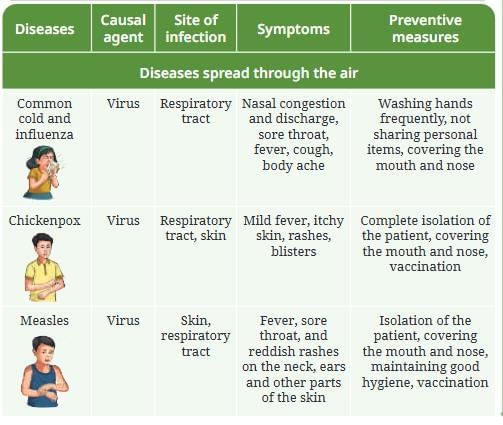

Diseases Spread Through Contaminated Water/Food: Diseases that occur when people consume water or food contaminated with pathogens like bacteria, viruses, or parasites.
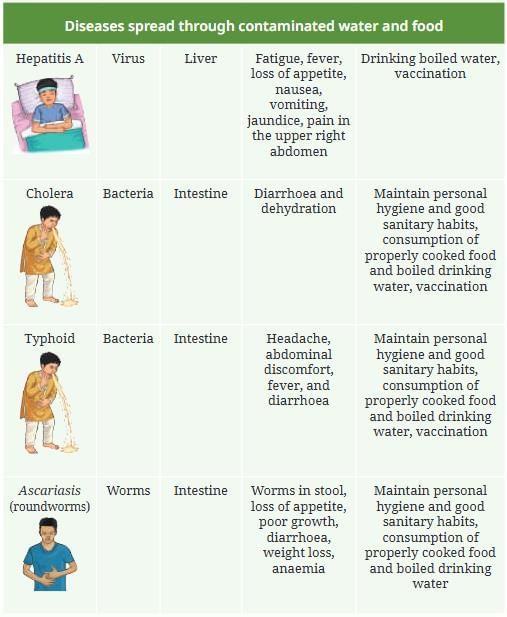
Diseases Spread by Insects (Vectors): Diseases that are passed on when insects such as mosquitoes or flies carry pathogens from one host to another, causing infection.
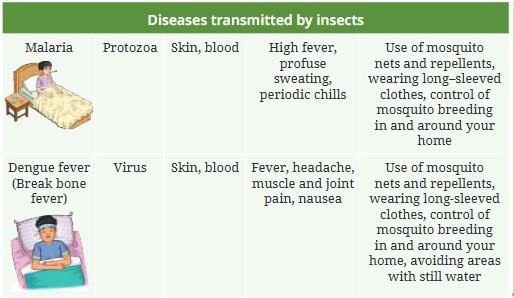
Prevention of Communicable Diseases
- Keep yourself and surroundings clean.
- Practice good hygiene (e.g., wash hands with soap).
- Cover mouth and nose when coughing or sneezing.
- Wear a mask in crowded places.
- Avoid sharing personal items (e.g., towels, handkerchiefs).
- Keep food and water clean.
- Stay home and rest when unwell to recover and avoid spreading disease.
- Use mosquito nets/repellents and control insect breeding.
How Are Non-Communicable Diseases Caused?
Non-communicable diseases (NCDs) like cancer, diabetes, and asthma are not caused by infections. Instead, they are linked to factors such as lifestyle, diet, environment, and body functions:
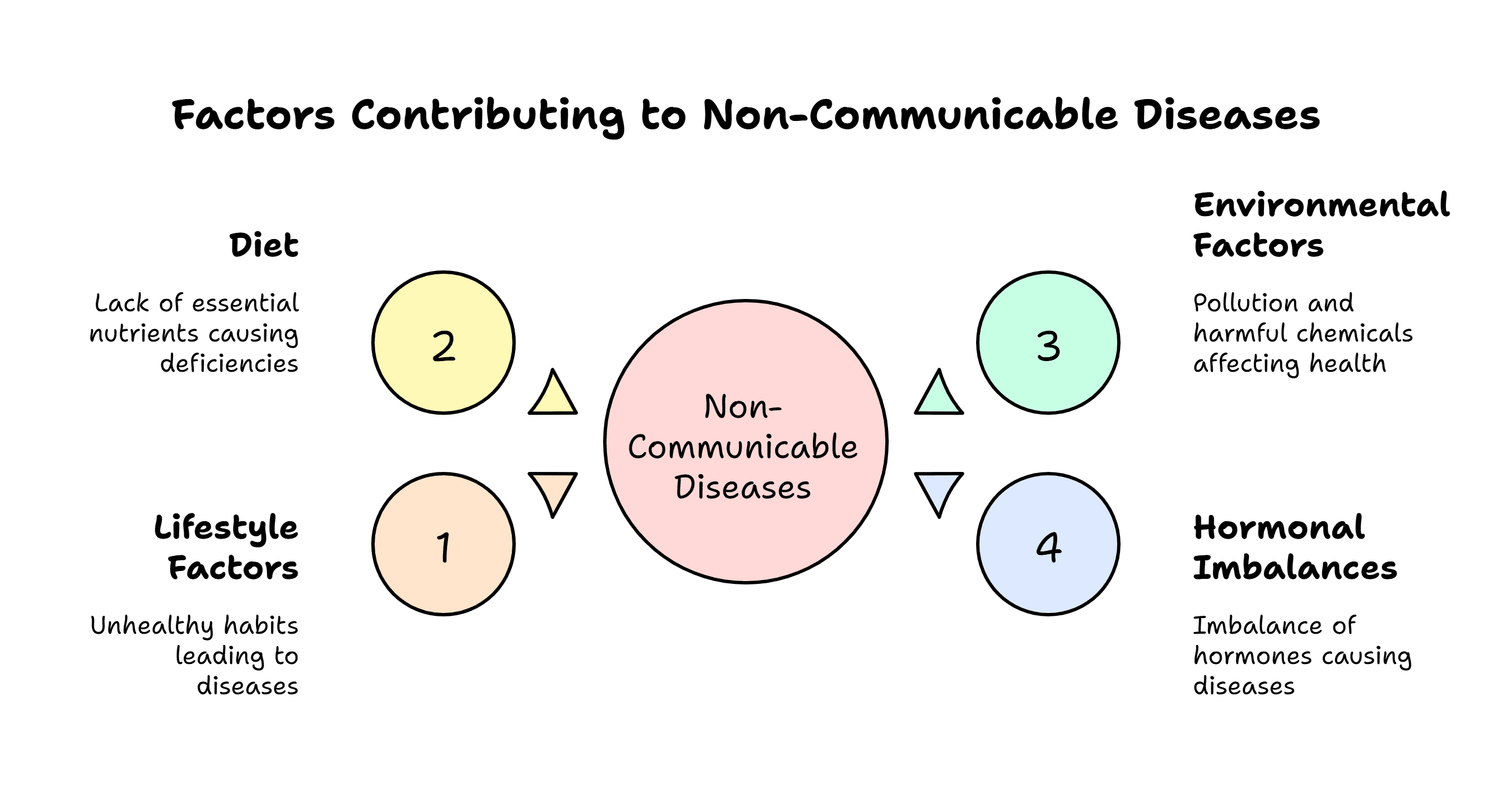
- Lifestyle Factors: Unhealthy habits like eating too much junk food, not exercising, smoking, or excessive stress can lead to diseases such as diabetes, heart disease, or some cancers.
- Diet: Not getting enough essential nutrients can cause deficiency diseases (e.g., scurvy from lack of vitamin C, anaemia from lack of iron, goitre from lack of iodine). These are also non-communicable.
- Environmental Factors: Pollution, exposure to harmful chemicals, or living in unhealthy surroundings can contribute to diseases like asthma or cancer.
- Hormonal Imbalances: Sometimes, diseases like diabetes happen due to imbalance of hormones in the body.
- Chronic Nature: NCDs usually last a long time (more than 3 months) and need ongoing care.
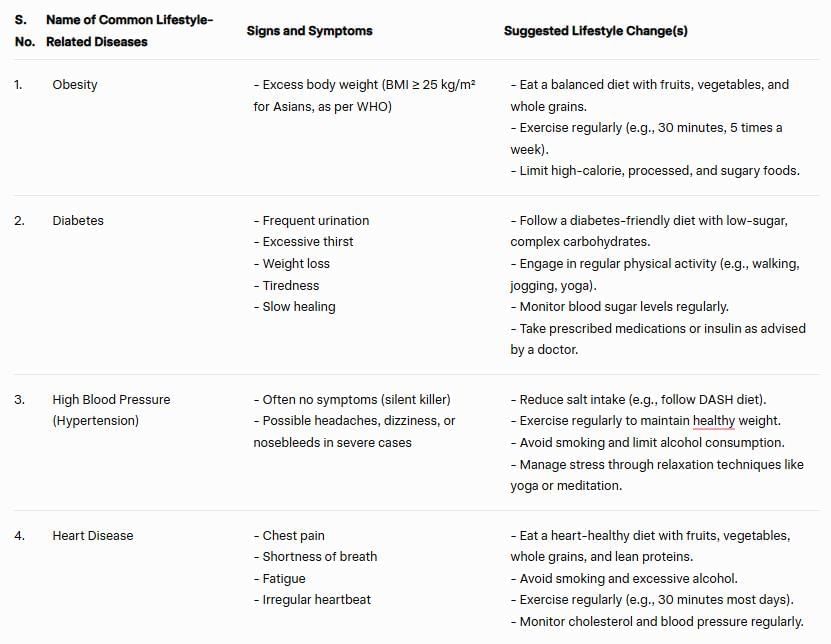
How to Prevent and Control Diseases?
You may have heard the saying: “Prevention is better than cure.” This means it’s easier and wiser to stop a disease from happening than to try to cure it after you get sick.
Good sanitation and cleanliness are some of the simplest and most effective ways to reduce the spread of diseases, especially those that spread from person to person or through contaminated water and food. Example:
Odisha — community-led sanitation campaign

- In Bhadrak district, Odisha, a community campaign encouraged people to build and use toilets.
- As more families stopped open defecation, child health improved, and diseases like diarrhoea and infections greatly reduced.
- Simple steps like building and using toilets, keeping surroundings clean, and good waste disposal prevent germs from spreading.
- Community action can have a big impact on public health—when people work together, the whole area becomes healthier.
Ability of the body to fight diseases
Why do some people get sick more often than others, even in the same environment?
- The ability of the body to fight diseases is called immunity.
- Our immune system is a group of special cells, tissues, and organs that recognise and fight off harmful germs (pathogens) that can make us sick.
Role of Vaccines
- Vaccines are special injections or drops that help your immune system become stronger against specific diseases.
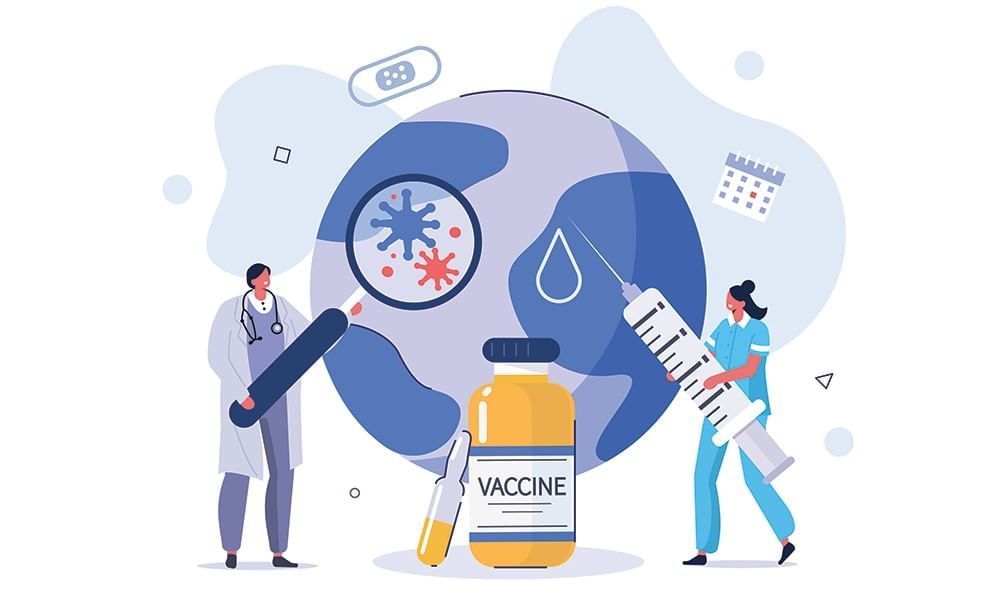
- They do this by “teaching” your body how to recognise and destroy certain germs before they can make you sick. This is called acquired immunity.
- Some vaccines use tiny, harmless parts of the germ (or a dead/weakened germ) to “train” your immune system.
- If you’re exposed to the real germ in future, your body is ready and can fight off the disease quickly.
- Tetanus shot: Contains a safe (inactive) form of a bacterial toxin, which helps your immune system learn how to fight tetanus without making you actually sick.
- Other common vaccines: Polio, measles, hepatitis, and more—many are given in childhood.
Edward Jenner and the smallpox vaccine
- Edward Jenner and smallpox vaccine: In the late 1700s, Jenner realized that people who got cowpox didn’t get smallpox. He created the first vaccine by using material from cowpox sores. This discovery eventually helped eradicate smallpox worldwide.
- In olden days, India also had a method called variolation, where a bit of material from a mild smallpox infection was used to protect healthy people.
Why are vaccines important?
- Vaccines prevent diseases: They are used before you get sick, to stop serious illnesses from starting at all.
- Community protection: When more people get vaccinated, diseases have less chance to spread—so even those who can’t get vaccinated are protected.
- Vaccines are safe and tested: Scientists and doctors check them carefully before use.
India’s Role in Vaccines
- India is a major global vaccine producer, supplying vaccines to many countries.
- Indian vaccine companies played a key role during the COVID-19 pandemic and continue to support global health efforts
Treatment of Diseases
If our immune system cannot fight off infection, we fall ill and need help from a doctor. The doctor gives us medicines, and sometimes these are called antibiotics.
What are antibiotics?
- Antibiotics are special medicines that kill bacteria in our body.
- They help cure diseases caused by bacteria, such as tuberculosis and typhoid.
- Important: Antibiotics do NOT work against diseases caused by viruses (like colds, flu, or COVID-19) or protozoa.
Discovery of Antibiotics
- In 1928, Alexander Fleming, a scientist in London, discovered the first antibiotic called penicillin.
- He found that a mould on a petri dish killed harmful bacteria growing there. This mould made a substance (penicillin) that stopped bacteria from growing.
- Since then, antibiotics have saved millions of lives.
What is Antibiotic Resistance?
- Antibiotic resistance happens when bacteria change and stop being killed by antibiotics that used to work.
- This makes infections much harder to treat and can cause longer illnesses and more complications.
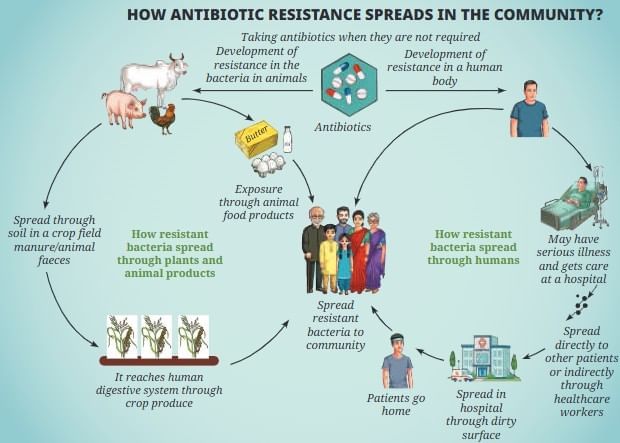
How does antibiotic resistance develop and spread?
- Taking antibiotics when we don’t need them (like for viral infections).
- Not finishing all the doses as prescribed by the doctor.
- Overuse of antibiotics in animals and plants.
- Spread can happen through people, animals, food, water, and soil.
- If you take antibiotics for a sore throat caused by a virus, bacteria in your body may become resistant to antibiotics.
- When farmers give antibiotics unnecessarily to animals (like cows), resistant bacteria can spread through meat, milk, or even through the soil.
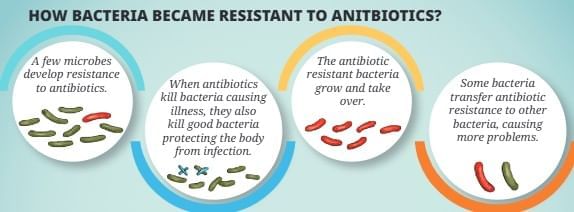
How to Prevent Antibiotic Resistance?
- Take antibiotics only when prescribed by a doctor.
- Always finish the full course of medicine, even if you feel better.
- Never use leftover antibiotics or someone else’s prescription.
- Avoid buying antibiotics without a doctor’s prescription.
- Farmers should avoid giving antibiotics unnecessarily to animals.
Remember: Using antibiotics wisely keeps them working for everyone!
Traditional Medicine Systems
- Systems like Ayurveda, Siddha, and Unani use natural remedies (herbs, oils, minerals) and focus on good food, exercise, and overall healthy living.
- They can be helpful in treating simple health problems and for everyday wellness.
- However, for some serious or advanced diseases, modern medicine may work better.
Managing Non-Communicable Diseases
Diseases like diabetes, cancer, and heart disease are managed by:
- Taking medicines (as advised by doctors)
- Making healthy lifestyle changes (diet, exercise)
- Rehabilitation (special help to get better)
- Early diagnosis and regular check-ups are very important.
Key Points to Remember
- Health means complete physical, mental, and social well-being—not just being free from diseases.
- Happiness and health go together: Being happy can help you stay active and healthy, and good health can improve your mood.
- A disease is any condition that stops the body or mind from working normally.
- Symptoms are feelings we notice ourselves (like pain or tiredness); signs are visible or measurable changes (like fever, rash, or swelling).
- Non-communicable diseases (like diabetes, cancer, and heart disease) are not caused by germs, but by lifestyle factors and environment. They can be prevented by eating healthy, staying active, and avoiding harmful habits.
- Communicable (Infectious) diseases are caused by pathogens—germs such as bacteria, viruses, fungi, or worms—and can spread from person to person.
- Good hygiene and clean surroundings are essential to prevent many diseases.
- Our immune system is the body’s natural defense that fights harmful germs and keeps us safe.
- Vaccines help our immune system “learn” how to fight certain diseases and provide protection before we actually get sick.
- Early diagnosis and proper treatment help manage, control, or cure many diseases.
- Healthy habits—like regular exercise, balanced diet, enough sleep, and positive relationships—keep both our body and mind strong.
- Antibiotics treat bacterial infections only, not viral ones. Overuse can cause antibiotic resistance—so take them only as prescribed.
- Prevention is better than cure: Practising good habits, getting vaccinated, and staying informed are the best ways to maintain health.
FAQs on Health: The Ultimate Treasure Chapter Notes - Chapter Notes For Class 8
| 1. What does it mean to maintain a healthy lifestyle? |  |
| 2. How do feelings and relationships impact our health? |  |
| 3. What are the differences between symptoms and signs of a disease? |  |
| 4. What are the common causes of diseases? |  |
| 5. Why is it important to understand signs and symptoms of illness? |  |

















